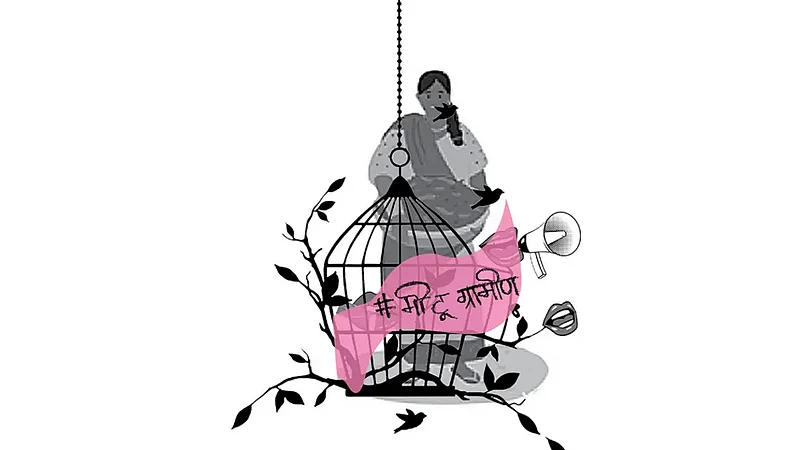At Khabar Lahariya, our larger, long-term context was that of running a media institution set against the logic of media businesses—with women from the margins at the centre of news production as journalists and subjects, and poor communities as consumers of news. This was constantly challenging, editorially and otherwise. In the case of a new series, #Me-TooRural—as in many cases of structural violence that Khabar Lahariya reports on (for instance on migration, bonded labour or caste violence)—subjects of stories would share their experience off-the-record, or even on record, but would rescind their statements after the interview was over, or in a second or third conversation. In one case in Chitrakoot district, where Khabar Lahariya was founded, in the weeks between the recording of a reporter’s testimony and publication of her story, the perpetrator of harassment, once her close friend and colleague, went to jail, was released, filed a case against her and decided to contest the general election for a new ‘progressive’ party. The reporter withdrew her statement and then, broken and betrayed, reapproached Khabar Lahariya for support in the form of justice and counselling. Unlike the perpetrator, she was out of work and discredited widely online and offline. This happened again and again in the #MeTooRural series. With Khabar Lahariya’s embedded, invested local understanding of crisscrossing relationships, or those that sour and sweeten over time, holding an absolute version of the truth became too heavy a responsibility to carry.
How A Small Media Group Looked At MeToo Through The Eyes Of Rural Women
With Khabar Lahariya’s embedded, invested local understanding of crisscrossing relationships, or those that sour and sweeten over time, holding an absolute version of the truth became too heavy a responsibility to carry

The attempt did allow some powerful stories to emerge, however. One was that of Neetu Shukla, a 22-year-old constable posted in a remote police station in Banda district who allegedly committed suicide in September 2018. As Twitter erupted with #MeToo testimonies by urban mediapersons in October and November, Neetu’s alleged suicide was hotly reported in the regional news media.? She had been jilted by a colleague; a ‘blue’ film had been shot and was about to be posted online; she was complaining about abuse by an older female colleague—the compulsorily sensational tone of reporting on violence against women in the Hindi news media had much material to use. Hatya ya aatmhatya (murder or suicide) is an all- too-common headline in the heartland press, given the norm of covering up the murders of women. It seemed significant, then, for Khabar Lahariya to dive into the case as its first #MeTooRural investigation. It allowed us to speak to the many hurdles women in the rural workplace repeatedly confront, given the high stakes of losing a job, especially a permanent government job. The consequences of investigating or making public these stories of abuse could be more dire than being fired or suspended. In Neetu’s case, it was death. Neetu’s story became even more significant to me, against the background of the she-said-he-said on various Twitter handles. The dark and dubious information available about Neetu’s life and death contrasted with the graphic and petty details of #MeToo testimonies in the urban context. Where both overlapped, however, was in the obfuscation of the structural underpinnings of the sexist workplace. The investigation of the death of a young police constable thus seemed a stark and significant way in which to pull a very different social location and experience into the purview of the #MeToo movement. Could this case, in a small town in rural India, have a #MeToo moment, or access justice through a digital exposé? Despite the impossibility of the investigation (relevant witnesses were transferred and inaccessible; police files were closed; neighbours and eyewitnesses refused to go on record, and those who did had versions which sounded like the crime thrillers they loved to watch), we still considered documenting and publishing this story an important way to expose how diligently harassment of women in a workplace can take place and be obscured, as though it was entirely fictional, a spurious news report.
(This appeared in the print edition as "#MeTooRural and Teething Pains")
(Views expressed are personal)
ALSO READ
(This piece is excerpted from an essay titled '#MeToo and the troubling of the rural public sphere in India: a feminist media house reports from the hinterland', first published in?Intimacy and Injury: In the Wake of #MeToo in India and South Africa, edited by Nicky Falkof, Shilpa Phadke and Srila Roy. (Manchester University Press, 2022))
Disha Mullick Is the co-founder of Chambal Media which produces feminist media for rural audiences in India
- Previous Story
 Elections 2024: Ashok Tanwar Joins Congress Again; Sehwag Endorses Congress Candidate In Haryana
Elections 2024: Ashok Tanwar Joins Congress Again; Sehwag Endorses Congress Candidate In Haryana - Next Story
























